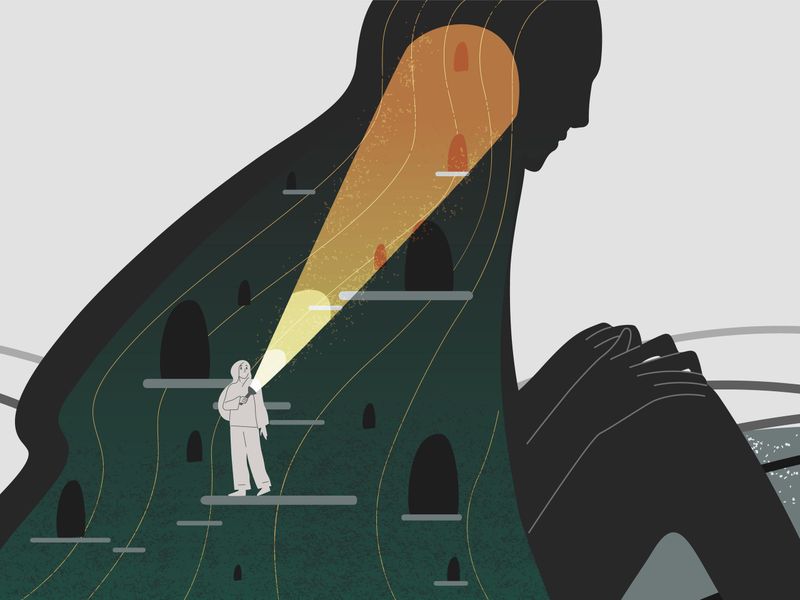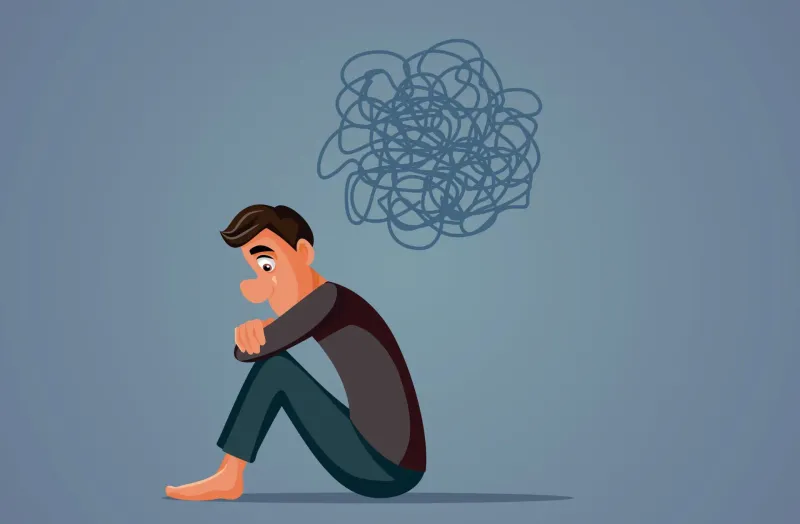O termo “lazy” often carries a negative connotation, implying a lack of motivation or care. However, certain habits perceived as laziness can be deeply rooted trauma responses.
These habits are not mere excuses but are grounded in survival mechanisms developed in response to past experiences. Understanding these behaviors as trauma responses allows us to approach them with empathy and compassion.
Let’s explore 17 habits that, at first glance, might seem lazy but are, in reality, profound responses to trauma, revealing the underlying emotional context that shapes them.
1. Putting off small tasks because they feel overwhelming
Seemingly simple tasks can feel like insurmountable hurdles for someone coping with trauma. The brain, overwhelmed by past experiences, can find even minor responsibilities daunting. This response is not about neglect, but a reflection of emotional overload. Each task carries an emotional weight, turning everyday duties into significant challenges.
This habit often stems from a mind trying to protect itself from further stress. By recognizing the emotional context, we validate the experience of those who find small tasks overwhelming. It’s a reminder that the simplest of actions might require the greatest courage when viewed through the lens of trauma.
2. Struggling to start the day—even with enough rest
Waking up with a sense of dread, even after adequate sleep, is a common experience for those living with trauma. The morning, instead of feeling like a fresh start, can be burdened with anxiety and emotional fatigue. This struggle is not about laziness or lack of energy, but the weight of unresolved emotions carried into the new day.
Facing the world each morning can feel overwhelming, as the mind anticipates the challenges ahead. Recognizing this struggle as a trauma response helps in understanding the complexities behind what might appear as reluctance to start the day. It’s an emotional battle that requires compassion and understanding.
3. Avoiding phone calls due to social anxiety
For many, the sound of a ringing phone can trigger deep-seated anxiety. This avoidance is not about being anti-social but is often rooted in the fear of judgment or confrontation. Trauma can heighten social anxiety, making interactions feel threatening. The pressure to respond appropriately adds to the stress, causing a retreat from communication.
It’s not an act of avoidance out of laziness, but a coping mechanism for dealing with overwhelming social pressures. Recognizing this behavior as a trauma response allows for a more compassionate approach, understanding that each call represents potential emotional turmoil rather than a simple interaction.
4. Leaving messages unread out of fear
The sight of unread messages can evoke a sense of dread for those dealing with trauma. Each notification brings potential confrontation, judgment, or emotional labor. This habit is not about neglect or apathy but stems from a fear of engaging in emotionally taxing interactions. Leaving messages unread becomes a shield against perceived threats.
By understanding this as a trauma response, we see the deep-rooted fear rather than irresponsibility. It’s an act of self-preservation, where the emotional cost of responding feels too high. Addressing this requires empathy, acknowledging the invisible battles faced when dealing with communication.
5. Forgetting appointments because their brain is overloaded
Forgetting appointments is often attributed to disorganization, but for those with trauma, it’s a sign of cognitive overload. The brain, burdened by past experiences, struggles to manage everyday tasks and responsibilities. This forgetfulness is not intentional but a reflection of mental exhaustion. Each appointment competes with a crowded mind trying to navigate emotional turmoil.
Recognizing this as a trauma response shifts the narrative from one of negligence to understanding. It highlights the need for patience and support, acknowledging that forgetfulness can be a symptom of deeper emotional struggles rather than a lack of discipline.
6. Overthinking simple decisions
Simple decisions can become a labyrinth for those affected by trauma. The mind, riddled with self-doubt and fear, struggles to make choices without overanalyzing every potential outcome. This isn’t about indecisiveness born from laziness but a coping strategy to avoid potential harm. Overthinking becomes a way to manage anxiety, ensuring every decision is the safest one.
This habit reflects a heightened state of alertness, where even trivial choices carry significant weight. By recognizing this as a trauma response, we can offer understanding and patience, seeing the underlying fear rather than mere indecision.
7. Spending hours “zoning out”
Zoning out isn’t just daydreaming; for many, it’s a way to escape overwhelming emotions. When the brain is saturated with stress, it retreats into a state of dissociation, providing temporary relief from reality. This habit is not about laziness, but a subconscious attempt to manage emotional overload. It’s a protective mechanism, allowing the mind to distance itself from trauma’s weight.
Recognizing this behavior as a trauma response invites compassion, understanding that zoning out is a survival technique rather than a lack of focus. It highlights the mind’s resilience in finding ways to cope amidst emotional chaos.
8. Needing more rest than others think is “normal”
For those carrying the weight of trauma, rest isn’t merely about physical recovery. Emotional exhaustion requires more recuperation, often leading to extended periods of sleep. This need for rest is not rooted in laziness but in the body’s attempt to heal from emotional wounds.
The mind and body, constantly battling stress, demand more time to recharge. Recognizing this as a trauma response emphasizes the importance of self-care and understanding. It’s a reminder that healing is not linear, and the need for rest reflects the burden of past experiences, requiring both patience and empathy.
9. Ignoring clutter because it feels too big to tackle
Clutter can become a mountain for those dealing with trauma. Each item represents a task, and together, they form an overwhelming obstacle. This isn’t about laziness or disregard, but about feeling emotionally paralyzed by the enormity of the task. The clutter reflects the chaos inside, where the mind feels incapable of managing both external and internal disorder.
Recognizing this behavior as a trauma response allows for compassion, understanding that the mess is more than physical; it’s tied to emotional struggles. It’s a call for support, showing that tackling clutter requires more than just effort—it demands emotional resilience.
10. Constantly saying “I’ll do it later” but never starting
The phrase “I’ll do it later” becomes a mantra for those grappling with trauma. It’s not about procrastination from laziness, but from fear of failure or inadequacy. The habit of postponement is rooted in anxiety, where starting a task feels too intimidating. The mind, striving to protect itself, delays action to avoid potential triggers.
Recognizing this as a trauma response reveals the internal struggle, where each postponed task is a reflection of deeper emotional battles. It’s a call for empathy, understanding that beneath the surface lies a heart striving to heal amidst apprehension and doubt.
11. Feeling frozen when too many tasks pile up
When the to-do list grows, so does the feeling of being trapped. For many with trauma, the accumulation of tasks leads to a state of paralysis. This is not about laziness but an overwhelming sense of helplessness. The mind, struggling to prioritize, becomes immobilized by the sheer volume of responsibilities.
Each task adds to the weight, creating a barrier to action. Recognizing this as a trauma response shifts the focus from blame to understanding. It emphasizes the need for support, acknowledging that feeling frozen is a symptom of emotional overload, not a lack of willingness to work.
12. Delaying self-care because they feel undeserving
Self-care becomes a challenge when feelings of unworthiness prevail. For those with trauma, the act of caring for oneself can feel like a privilege they haven’t earned. This isn’t about neglect or laziness, but a reflection of deep-seated beliefs about self-worth. Delaying self-care is a symptom of emotional wounds, where the mind struggles to prioritize its well-being.
Recognizing this as a trauma response encourages empathy, highlighting the need for validation and support. It’s a reminder that self-care is an essential part of healing, despite the internal voices that suggest otherwise.
13. Struggling with consistency in routine
Routines offer structure, yet for those with trauma, maintaining consistency can be a monumental task. This struggle is not about laziness but is rooted in unpredictability and fear. Trauma disrupts the sense of normalcy, making it challenging to commit to regular schedules. The mind, preoccupied with managing emotional turmoil, finds it difficult to adhere to routines.
Recognizing this as a trauma response invites compassion, understanding that the inconsistency is a reflection of an internal battle. It’s a call to offer support, acknowledging the courage it takes to navigate through chaos while striving for stability.
14. Needing long breaks between tasks
Extended breaks are often misunderstood as laziness, yet for many with trauma, they are necessary recuperative periods. The mind and body, taxed by emotional stress, require time to recharge between activities. This need for long breaks isn’t about avoiding work but about managing energy levels influenced by past experiences.
Recognizing this as a trauma response highlights the importance of allowing oneself time to heal. It’s an acknowledgment of the resilience required to perform tasks amidst emotional exhaustion. Offering understanding and patience underscores the value of self-care in the journey towards healing.
15. Being overly reliant on distractions
Distractions serve as a refuge for those overwhelmed by trauma. The mind, unable to bear the weight of emotions, turns to external stimuli as a form of escape. This isn’t about laziness but a survival strategy to cope with distress. The reliance on distractions reflects the need to divert attention from internal chaos.
Recognizing this behavior as a trauma response emphasizes the importance of empathy and understanding. It’s a reminder that beneath the surface, there’s a heart seeking solace amidst turmoil. Offering support can help guide the journey towards finding healthier coping mechanisms.
16. Saying “I’m just tired” when it’s really emotional exhaustion
The phrase “I’m just tired” often masks the reality of emotional exhaustion. For those with trauma, physical fatigue is intertwined with emotional depletion. This isn’t about laziness but about the deep-seated weariness that accompanies emotional battles. The mind and body, constantly on alert, become exhausted from the weight of past experiences.
Recognizing this as a trauma response calls for empathy, understanding that the fatigue signals a need for healing. It’s a reminder of the resilience required to face each day, and the importance of offering support to those navigating the complexities of emotional exhaustion.
17. Avoiding progress because success feels unsafe
Success can be daunting when it feels unfamiliar and unsafe. For those with trauma, progress represents change, which can trigger anxiety and fear. This avoidance is not about a lack of ambition but a protective mechanism against perceived threats. The mind associates success with vulnerability, making it difficult to embrace accomplishments.
Recognizing this as a trauma response allows for a compassionate perspective, understanding that the fear of progress is rooted in past experiences. It’s a call to offer support and encouragement, helping individuals find safety in their achievements and confidence in their abilities.


















